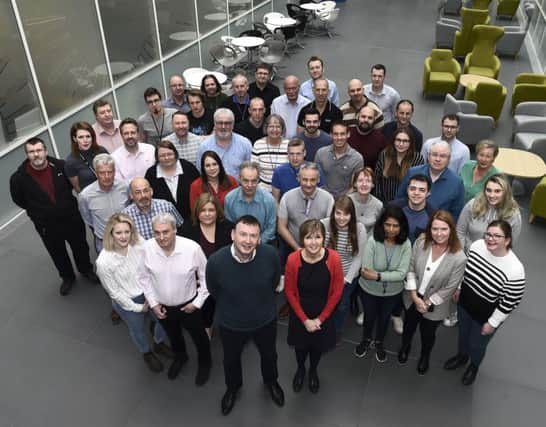The Edinburgh fintech powerhouse oiling the nation’s financial transactions


It was the year of the Poll Tax, Tiananmen Square protests and the fall of the Berlin Wall; we danced to Stock, Aitken and Waterman records and no fewer than 27 million people tuned into Coronation Street to see the then resident baddie hit by a tram.
While football fans cheered Scotland’s qualification for the World Cup in Italy, at CERN in Geneva, Tim Berners-Lee was sharpening his pencil.
It would be a further year before the computer scientist’s idea for an information sharing system came to fruition and he would be mulling over whether to call it The Mine of Information, The Information Mesh or just the World Wide Web.


However, back in 1989, in a horseshoe-shaped building at Heriot-Watt University known as the Origo Centre, another idea was rapidly evolving.
Years ahead of its time – and possibly unforeseen by the handful of staff working there – it would go on to stake a claim as one of the UK’s first fintech businesses and – perhaps most surprising of all –continue at the forefront of the rapidly evolving sector for the next three decades.
This year marks the 30th anniversary of Origo, the fintech powerhouse behind countless financial transactions and a key component in ensuring the nation’s financial services sector can interact faster, with less fuss and more security to bring a fluid, seamless service to its professionals and their customers.
What started with just three people brought together as the 1980s drew to a close with a vision for a behind-the-scenes framework which would enable financial service providers to communicate electronically, has now ballooned in scale, function and expertise.
Today, Origo employs 70 fintech experts. Its initial innovation, Open Standards – devised to enable the financial services to securely operate using a common set of protocols, technical details and data – is now just one component in a suite of innovative products that raise efficiency and improve outcomes for a range of businesses, organisations, financial advisers and their clients.
But it’s not every day you’re 30. So how does the nation’s original Fintech celebrate?
According to Anthony Rafferty, Origo’s managing director, there is just one way for the business that laid the foundations of Scotland’s burgeoning fintech sector to mark the occasion – and that’s to work even harder.
“Origo is going from strength to strength,” he says. “We are probably the UK’s and certainly Scotland’s longest-established fintech, but we are definitely not complacent.”
The MD may be considered something of a new-start compared to ‘employee number one’, Laura Reed, who turned up for work as a personal assistant on that first day in 1989 and remains with the firm three decades on as executive assistant, but he is far from a stranger to the business.
Rafferty arrived in January 2018 with a solid career behind him in financial service businesses – among them RBS, Bank of Scotland and latterly Aviva – that make every day use of Origo’s backroom technology to ensure smoother, smarter transactions.
It was a bit like coming home for Rafferty – he was raised in Wester Hailes, a stone’s throw from that Heriot-Watt building where it all began. And it should be borne in mind that Origo was established a year before the first web browser was launched.
Rafferty reflects: “Pension and life insurance companies must have been bemoaning the fact that doing stuff electronically was expensive and for the financial advisers they were interacting with, it was very inconsistent, because each company was doing it differently.”
Initially, four financial services businesses were on board with Origo. Two operators seconded from Standard Life and Norwich Union were charged with establishing common processes which would ensure that everyone involved spoke the same technical language, so issues such as getting quotes and sending data became so much more simple and secure.
Before long the operation’s original name, Open Framework for Intermediary Services, was changed to Origo and its first portal – its ground-breaking Open Standards – was launched 12 months after.
Flick the calendar forward dramatically and Origo is now based at Edinburgh Park and owned by 14 UK financial services shareholders – among them Aviva, Scottish Widows, Aegon, Prudential and Standard Life – whose priceless input ensures that its products are precisely what the industry needs and wants.
The scale of Origo’s contribution to the financial services sector is impressive; its fintech solutions provide secure access for eight-out-of-ten UK financial advisers to a wide range of financial businesses, enabling them to authenticate themselves instantly and carry out fuss-free, fast transactions on behalf of their clients.
At the same time, Origo engages with a range of industry bodies, platforms, portals, software suppliers and government bodies to seek out ways to increase efficiency and reduce costs.
Among its most significant products is the Origo Transfer Service. Launched in 2008, it has smoothed the passage of £170 billion worth of pension and ISA transfers, providing a faster and safer system which benefits financial advisers, their clients and financial services business.
At last count, the innovation was being used by almost 120 financial service companies.
The transfer technology means that a transaction that might once have taken several weeks to carry out is cut to a few days and, in some cases, hours.
Nevertheless, it is just one of a range of Origo services. And with 30 years behind it, Rafferty is clear on what the ‘magic formula’ is for the fintech’s success. “We have been quite canny in how we have done things,” he says. “Because we’re owned by 14 different financial service companies, we have access to the users of our services.
“We have great focus groups with key users of potential services who help to influence development plans. We research things well with our customer base – we tend to get things right.”
One example is the Origo Integration Hub. Designed for platforms and adviser software systems, users just plug in once to open up connections with every other hub party. It helps protect against risk, lowers costs and takes care of any operational or legislative changes.
In the spirit of constant evolution, Origo has now launched a new tracking element, so financial advisers can follow clients’ transfers online in real-time, eliminating the prospect of chasing for progress updates.
“We stay very close to customers,” Rafferty adds. “Our second key ingredient is that our staff are world experts in fintech. That’s really important.
“Thirdly, we are creative and flexible. We try stuff out and we are not afraid to fail. We check out ideas, but we don’t test stubbornly and continue if it’s not working.”
Launching soon is a highly-secure e-mail service, which Rafferty describes as a “game changer”.
“It’s relatively easy for fraudsters to read someone’s e-mail as it goes over the internet,” he explains. “It’s no safer than sending a postcard with your bank details through the post, and even encrypted e-mails have problems.
“We are launching Unipass Mailock for securing e-mails. Unipass is already well known – 80 per cent of financial advisers use it every day.”
Unipass Mailock features world-class encryption so users can be confident their message is only read by intended recipients with an automatic read receipt as standard.
It also removes the terror of an accidental ‘send’; users can recall an e-mail and remove all trace of it.
Rafferty is full of praise for FinTech Scotland and Scottish Financial Enterprise’s efforts to nurture new businesses, support the more established and recognise their efforts. It’s a source of pride that Origo was among five businesses shortlisted for Scottish Financial Enterprise’s 2018 Scottish Financial Services Award.
And, of course, he is constantly looking forward – blockchain technology is just one area being scrutinised by Origo – keen to broaden the fintech’s horizons, perhaps to an international level.
“I’d like to think that in 30 years’ time we’ll be celebrating 60 years of Origo all over the world,” he adds. “There’s huge potential to do what we do in other countries.”